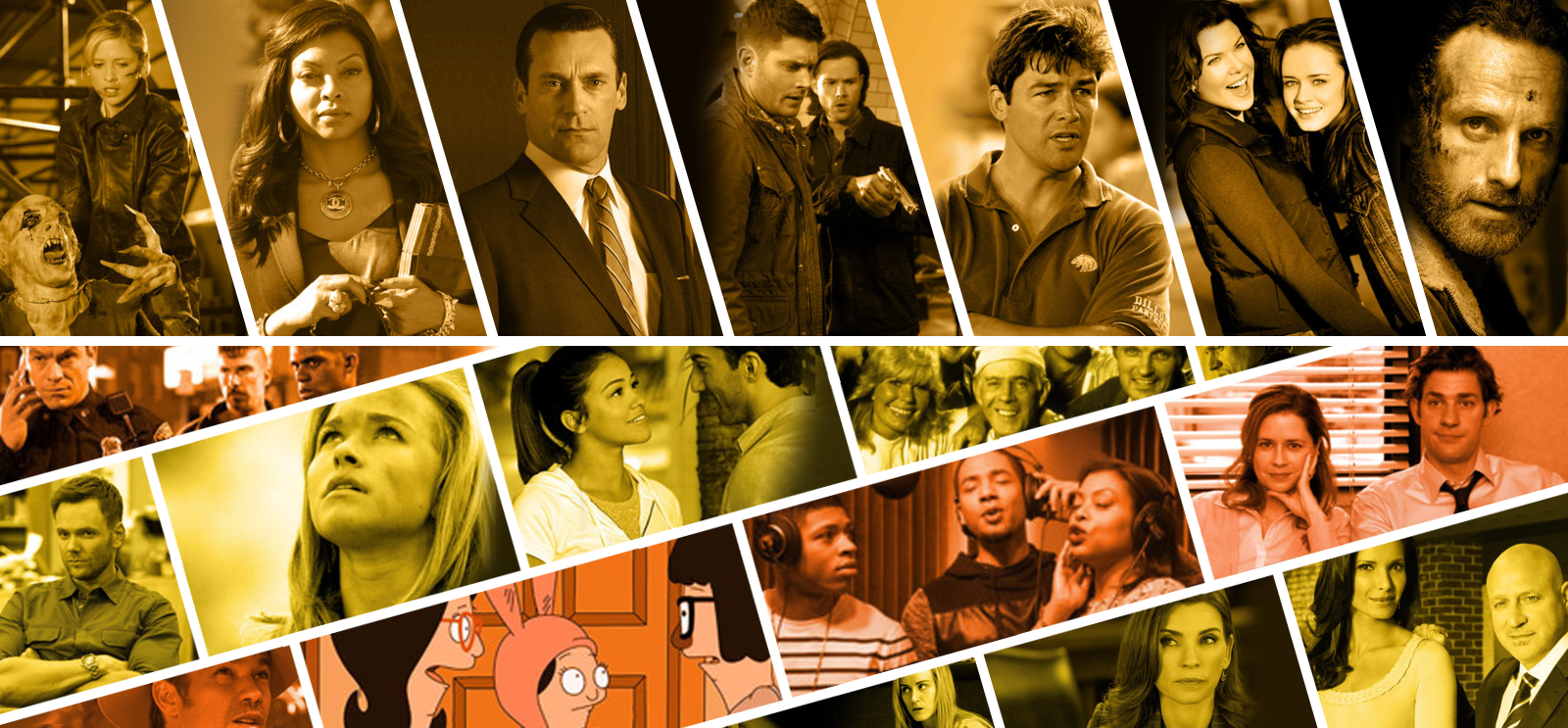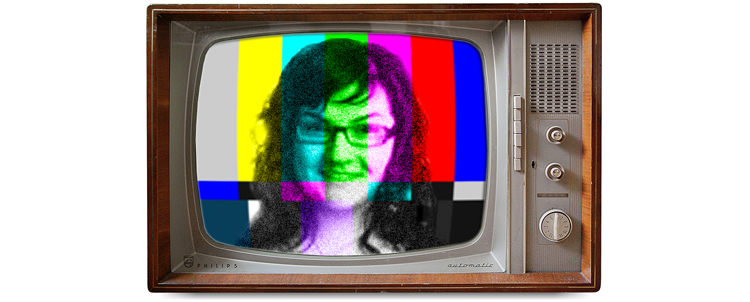
Above: TV show stills collage inspired by the art that accompanies Margaret Lyons’s (AB’04) New York magazine columns. (Images courtesy Fox, HBO, CW, FX, AMC, NBC, CBS, and Netflix) Below: Portrait of Margaret Lyons. (Photo courtesy Margaret Lyons; digital collage by Joy Olivia Miller)
Television critic Margaret Lyons, AB’04, discusses how her time at the Maroon derailed her plans to attend divinity school.
Television critic Margaret Lyons’s career has come full circle since her days writing for the Maroon. From 2003 to 2004, she penned a pop culture column called Stay Tuned, which now is the name of the TV-watching advice column she writes for New York magazine, where she is an associate editor. I caught up with Lyons, AB’04, to get a behind-the-scenes look at the life of a professional television critic and find out how a religious studies major at the University of Chicago ended up doing what she does.

What’s your typical TV-reviewing setup?
I generally watch things in my apartment, in various states of pajama, sometimes during the workday, sometimes during traditional prime-time TV hours, and often late into the night. Depending on the show, and depending on what I’m watching it for exactly, I can tolerate a lot of distraction. (Not true if I’m writing, in which case I can tolerate no distraction. No music, no nothing.) I write everything in TextEdit, so I usually have at least one document open for notes, one for full sentences that come to mind, and then one where I compose the actual article. Again, this varies by the kind of piece I’m working on. If I’m doing a straight-up review, I focus as much as possible just on the show, but if it’s more of “this is a show I keep up with but am not writing about at this very moment,” odds are I am multitasking.
You majored in religious studies at the University of Chicago. How did that come to pass?
I was always super interested in religion and religiosity. My mom is Catholic, and my dad’s an agnostic Jew, and I always had lots of questions. I’m a real rules-and-structure person. I was an altar girl, I know every word to Godspell and Jesus Christ Superstar, and I was always fascinated how people thought God worked. I wrote a paper in high school about how the parables in the Gospels are retold in The Great Gatsby, and I remember thinking, “Yeah, I like thinking about wisdom texts in this capacity,” but I always assumed I’d graduate with a math or science degree. Honestly, I still consider myself more of a math and science person than a humanities person, but life is strange. The University didn’t have minors when I was there, but if it did, I’d have a math minor. I think? I took a solid amount of math.
Toward the end of my third year, when it became clear that I wasn't going to pursue more math after college, I did assume I’d wind up continuing to work in that field. I was—and am!—particularly interested in what happens when institutions of religious power encounter institutions of secular power, for example in the United States, when perhaps the government has infringed on someone’s right to free practice. My BA was about the definition of religion in the US Supreme Court, and my vague plan was to do a joint law school/div school program and then battle injustice. This is Sliding Doors me, and I still think about it.
I always enjoyed pop culture, and I come from a family that’s very into TV and movies and books, but I didn’t ever think I’d be a writer. I was a copy editor at the Maroon for four years, but I only wrote about TV my fourth year. That turned out to be a lot of fun, and here we are.
Speaking of the the Maroon, how frequently do you look back on your earlier writing? What have you noticed that has changed about how you write since you first started publishing?
How often do I actually dig it up? God, very, very rarely. As rarely as possible. I think I’m less cynical now than I was when I first started out, and I probably get to the point a lot faster.
How did your time at UChicago influence you in your postgraduate life?
I met several of my closest friends at the University of Chicago, so there’s that. I loved U of C. I like working hard, I like reading, I like math problems, I like underlining things in books, I like writing, and I especially like arguing. The University was proof that I wasn't alone, and sometimes I think that’s the most important thing I learned there. Awwww. I’m not sure I’d be able to figure out which parts of my adult brain and life aren’t influenced by my time at U of C, intellectually, emotionally, etc.
I’ll also add that copyediting the Maroon for four years made me a better writer, editor, and journalist than anything else possibly could have. Training yourself to look for errors, to spot sloppy thinking, to work efficiently, all that jazz—I am grateful to have had the chance to learn in that environment too.
What show, right this second, is the one you most look forward to watching?
Jane the Virgin, Being Mary Jane, Broad City, The Fosters, and Girls.
What's a show that everybody loves (or loved) that you just don't get the hype about?
The Leftovers. I just do not get what people see in that show.
